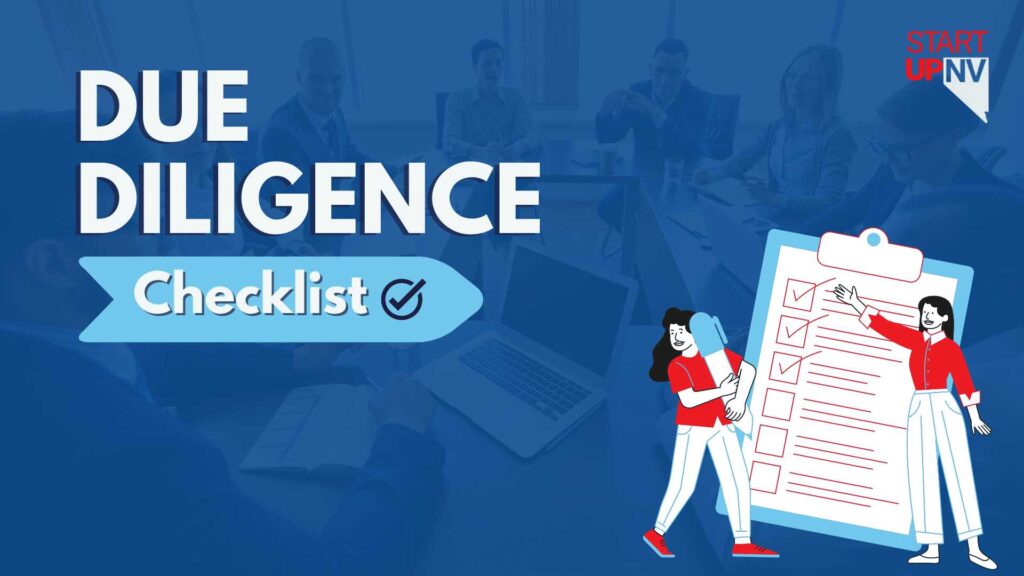Free Startup Due Diligence Tips
Built from StartUpNV’s years of experience and thousands of deals seen.

Are you an investor ready to uncover the next big thing but wary of the risks? This is a must-have resource designed to help you make informed, confident decisions. In the high-stakes world of startup investments, thorough due diligence is not just a formality; it’s a critical process to safeguard your investments and ensure you’re backing the right ventures.
Due diligence is the bedrock of prudent investment. It enables you to dive deep into a startup’s business model, financial health, market potential, and management team, helping you identify red flags and uncover hidden opportunities. This comprehensive process mitigates risk and increases the likelihood of your investment success.
Due Diligence Can Make Or Break Your Investment
Investing in startups is exhilarating, offering the promise of substantial returns and the thrill of being part of groundbreaking innovations. However, this potential comes with significant risks. Without thorough due diligence, you might find yourself blindsided by unforeseen challenges that could jeopardize your investment.
Due diligence is the process of meticulously analyzing a startup’s fundamental aspects to assess its viability and potential for success. This includes evaluating the business model, scrutinizing financial statements, understanding market dynamics, and assessing the competency of the management team. Each element plays a crucial role in painting a comprehensive picture of the startup’s potential and pitfalls.
Key Benefits of Thorough Due Diligence:
- Risk Mitigation: By identifying and analyzing potential risks early, you can make informed decisions and avoid costly mistakes.
- Informed Valuation: Understanding the true value of a startup ensures you negotiate fair and favorable investment terms.
- Strategic Insights: Gain a deeper understanding of the market and competitive landscape, helping you gauge the startup’s growth potential.
- Operational Clarity: Evaluate the startup’s operations, processes, and scalability to determine long-term sustainability.
- Team Assessment: Assess the strengths and weaknesses of the management team, ensuring they have the capability and vision to execute their business plan.
The allure of investing in a promising startup can sometimes overshadow the need for a rigorous evaluation process. However, neglecting thorough due diligence can lead to disastrous consequences, turning a seemingly golden opportunity into a costly misadventure. Here’s how poor due diligence can result in a poor investment:
- Overvalued Investments: Without a detailed analysis of a startup’s financials and market position, you may end up investing at an inflated valuation. Overpaying can drastically reduce your return on investment and increase the time needed to realize any profits.
- Uncovered Liabilities: Hidden debts, pending lawsuits, or undisclosed financial obligations can emerge after your investment, significantly affecting the startup’s financial health and your expected returns. Comprehensive due diligence helps unearth these liabilities early on.
- Management Failures: The success of a startup heavily depends on its leadership team. Poor due diligence might overlook critical shortcomings in the management’s expertise, track record, or cohesion, leading to operational failures and strategic missteps.
- Market Misjudgment: An inadequate assessment of the market can lead to overestimating the startup’s growth potential. Understanding market dynamics, competition, and customer needs is vital to gauge the startup’s realistic chances of success.
- Operational Risks: Overlooking the startup’s operational processes, supply chain robustness, or technology infrastructure can result in significant setbacks. These operational risks can lead to inefficiencies, increased costs, and ultimately, business failure.
Assessing The Team
A startup’s team is its backbone, playing a crucial role in turning a vision into reality. The founding teams of some of the most successful companies underscore the importance of a well-rounded and cohesive group. For instance, the complementary skills of Larry Page and Sergey Brin at Google, or the dynamic partnership of Bill Gates and Paul Allen at Microsoft, demonstrate how diverse strengths and expertise can propel a startup to unprecedented heights. Assessing the team’s strengths, weaknesses, and dynamics is a vital part of the due diligence process. Here’s how you can thoroughly evaluate the key elements of a startup’s team:

Founders’ Backgrounds
The founders set the tone and direction for the startup. Investigate their professional histories, past ventures, and domain expertise. Look for patterns of success and learn from any past failures. Key questions to consider include:
- What relevant industry experience do the founders have?
- Have they successfully led or been a part of other startups?
- What lessons have they learned from past failures, if any?
Skills and Capabilities
Beyond the founders, assess the technical, managerial, and operational skills of the entire team. This evaluation helps ensure that the team possesses the necessary expertise to execute their business plan effectively. Consider the following:
- Are there any skill gaps that could hinder the startup’s progress?
- How well do team members complement each other’s skills?
- Do they have the necessary technical knowledge and experience in their respective fields?
Team Dynamics
The way a team works together can significantly impact the startup’s success. Observe their working relationship, decision-making processes, and methods for resolving conflicts. Effective communication and collaboration are indicators of a strong team. Reflect on:
- How well does the team communicate and collaborate?
- Are there clear and effective decision-making processes in place?
- How does the team handle disagreements and conflicts?
Advisors and Board Members
Advisors and board members bring valuable experience and guidance to the startup. Review their qualifications and contributions to understand the level of support the team receives. Key points to consider include:
- Do the advisors and board members have relevant industry experience?
- How actively involved are they in the startup’s operations and strategic planning?
- What specific expertise do they bring to the table?
A thorough assessment of the team provides insights into their ability to execute the business plan, adapt to challenges, and drive the startup toward success. A strong, cohesive team with the right mix of skills and experience is a positive indicator for potential investors.
Analyze Financials

A thorough analysis of a startup’s financials is crucial in understanding its economic health and potential for growth. Investors who took the time to deeply scrutinize the financials of companies like Amazon in its early days were able to see the long-term potential beyond initial losses. Similarly, those who invested in Google during its formative years, recognizing the financial projections and scalability, have seen substantial returns. Financial scrutiny helps investors make informed decisions and assess the viability of the business model. Here’s how you can systematically evaluate a startup’s financials:
Historical Performance
Start by examining past financial statements, including income statements, balance sheets, and cash flow statements. Historical performance provides insights into the startup’s growth trajectory, operational efficiency, and financial stability. Key aspects to review include:
- Income Statements: Analyze revenue growth, cost of goods sold (COGS), operating expenses, and net income over time.
- Balance Sheets: Assess assets, liabilities, and shareholders’ equity to determine the startup’s financial position and leverage.
- Cash Flow Statements: Examine cash inflows and outflows to evaluate liquidity and cash management practices.
Understanding how the startup has managed its finances historically helps predict future performance and identifies any financial red flags.
Revenue Streams
Identifying and evaluating all current revenue sources is essential to gauge their sustainability and potential for growth. Assess the diversity, reliability, and scalability of revenue streams. Key questions to consider include:
- What are the primary and secondary sources of revenue?
- How stable and recurring are these revenue streams?
- Are there opportunities for diversifying or expanding revenue sources?
A robust and diverse revenue model reduces dependency on a single source and enhances financial resilience.
Profitability
Assessing current profit margins and break-even points provides a snapshot of the startup’s profitability and operational efficiency. Key metrics to evaluate include:
- Gross Profit Margin: Indicates the efficiency of production and service delivery.
- Operating Profit Margin: Reflects the startup’s ability to manage operating expenses.
- Net Profit Margin: Shows the overall profitability after accounting for all expenses.
Understanding the break-even point helps determine how much revenue is needed to cover costs and start generating profit. These insights are critical for evaluating the startup’s financial sustainability.
Financial Projections
Review detailed financial forecasts for the next 3-5 years, including the assumptions underlying these projections. Financial projections provide a forward-looking view of the startup’s potential growth and financial performance. Key elements to review include:
- Revenue Forecasts: Assess the realism and assumptions behind projected revenue growth.
- Expense Forecasts: Evaluate the anticipated operational, marketing, and capital expenses.
- Profitability Projections: Analyze projected profit margins and net income.
- Cash Flow Forecasts: Examine expected cash inflows and outflows to ensure liquidity and operational stability.
Scrutinizing these projections helps verify whether the startup has a realistic and achievable financial plan, providing a clearer picture of future viability.
Main Takeaways
Investing in startups can be highly rewarding, but it comes with significant risks that require careful evaluation. Thorough due diligence is essential in identifying potential red flags and assessing the true potential of a startup. Here are the key takeaways for conducting effective due diligence:

Assessing the team is crucial. Examine the founders’ backgrounds, skills, and capabilities, as well as the team dynamics, decision-making processes, and conflict resolution methods. Additionally, reviewing the qualifications and contributions of advisors and board members can provide valuable insights into the startup’s potential for success.
Analyzing financials is another critical step. This involves reviewing historical financial statements to understand past performance, evaluating all current revenue streams for sustainability and growth potential, and assessing profitability, including profit margins and break-even points. Scrutinizing financial projections ensures they are realistic and achievable, providing a forward-looking view of the startup’s potential growth and financial performance.
Understanding the risks is also essential. Identifying potential operational, legal, and market-related risks and evaluating the startup’s preparedness to handle these risks can help you make more informed decisions.
Look for red flags such as inconsistencies or unrealistic assumptions in financial projections, and pay attention to any signs of poor management or governance. Being vigilant about these aspects can save you from costly mistakes and enhance your investment success.
By following a comprehensive due diligence process, you can make more informed investment decisions and increase your chances of success. Download our Free Startup Due Diligence Checklist to ensure you cover all critical aspects and make strategic, confident investments.
Interested in investing with StartUpNV? Click here!


